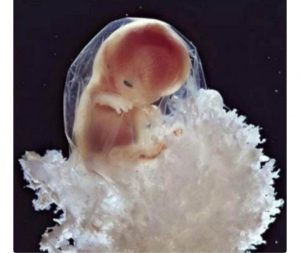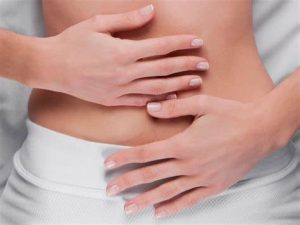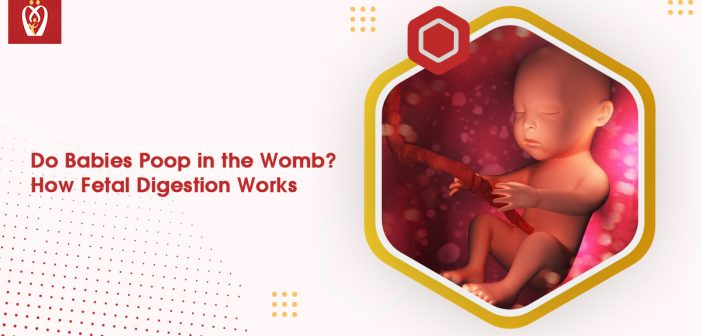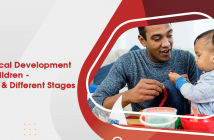Everything that goes in must come out. Although it isn’t always pleasant (or fragrant) to clean up, full diapers are one of the best indicators that a baby’s digestive system is working properly and that the efforts to feed that tiny mouth are paying off.
This process begins long before you give birth. Here’s how fetal digestion works (so to speak).
When do babies absorb nutrients from their mothers?

Around three to five days after conception, babies absorb nutrients from their mothers. It is when the fertilized egg gets its energy from nutrients secreted by Mom’s endometrium (the tissue lining the uterus).
The embryo forms a yolk sac shortly after implantation, usually eight to nine days after conception. Throughout most of the first trimester, the yolk sac provides critical nutrition and gas exchange between mama and baby until the placenta takes over around week 10 of pregnancy.
That means your baby is getting all of his nutrition from you from the start. His digestive system will not take control until he is born and begins consuming (and pooping) breast milk or formula.
In other words, what you eat during your pregnancy is important. Take your prenatal vitamin daily and eat a well-balanced pregnancy diet. It includes eating plenty of foods high in:
Folate (found in beans, avocados, leafy greens, fortified whole grain bread, and other foods) helps develop healthy new cells and helps prevent some congenital disabilities.
Omega-3 fatty acids (found in salmon, sardines, herring, walnuts, and DHA eggs) promote brain and eye development.
Vitamin D (found in fish, eggs, fortified orange juice, and cereal) promotes bone, tooth, eye, and skin health.
Calcium (found in dairy and dairy substitute products) promotes strong bones and teeth and a healthy heart, muscles, and nerves.
Do babies poop in the womb?
Babies pee a lot while in the womb but rarely poop until after birth. Meconium, a sticky greenish-black substance, gathers in your baby’s intestine during pregnancy. It is the first poop for the baby. Your baby’s poop is made up of the stuff accumulated in his intestines during pregnancy (like old skin and gastrointestinal cells).
The first diaper your baby wears usually contains meconium, but it is possible to find it in the womb. If that happens, there’s a chance he’ll inhale some meconium-stained amniotic fluid, which could irritate his lungs or lead to serious illness.
So, if you’re leaking green or brownish amniotic fluid, call your GP or midwife immediately. The Nurturey pregnancy app instantly allows you to schedule an appointment with your GP or midwife. Your practitioner may decide to hasten delivery and assess your baby as soon as he arrives.
How does fetal digestion work?
During pregnancy, the fetal digestion system grows rapidly from a layer of cells to a full-fledged nutrition-delivery system. Here’s a rundown of how your fetal digestion system develops from one trimester to the next.
First Trimester

The embryo develops three layers of cells during the first few weeks of pregnancy. The endoderm is the innermost one and will eventually become your fetal digestion system (as well as other structures, like the liver, lungs, pancreas, and gallbladder). The mesoderm, or middle layer, is where the sex organs, bones, kidneys, and muscles are formed. Finally, the nervous system, hair, skin, and parts of the eyes develop from the ectoderm or outer layer.
At its most basic, the fetal digestion system is a network of tubes (such as the esophagus and intestines) that connect the mouth (the entry point) to the anus (the exit). That tube and its waiting room start forming by 8 weeks of gestation (aka the stomach). However, for the time being, the intestine loops are too large to fit inside your baby’s tiny little belly, so they bulge into the umbilical cord. (It’s only for now!)
Although the kidneys are not part of the urinary system, they perform a similar function in that they help the body remove waste. And by the time you’re 8 weeks pregnant, your baby will have gone through two sets of temporary kidneys and will be forming the permanent set.
By week 10, the baby’s stomach and permanent kidneys are busy producing digestive juices, enzymes, and urine. However, your baby will still receive all of the nutrition he requires (and excrete all of the waste he does not) from you through the yolk sac.
Second Trimester

Your baby’s digestive system is ramping up just as yours is settling down (goodbye, the morning sickness!). The fetal digestion system’s structures are fully formed and in the right places early in the second trimester. Around the same time, the placenta completely replaces the yolk sac, providing all of your baby’s nutritional needs (while eliminating waste) through the umbilical cord until your baby’s birth.
For the time being, it’s all about practice: Baby starts sucking and swallowing amniotic fluid, and the muscles and organs of the fetal digestion system begin to contract. He also pees frequently. All these are tasks on which your baby will rely for digestion once he is out in the world, consuming breast milk, formula, and, eventually, solid food.
At this point, your baby has taste buds on his tiny tongue. So the flavors of the foods you eat are present in the amniotic fluid your baby swallows daily.
Third Trimester | fetal digestion
As your pregnancy nears the end, fetal development focuses on growth as your baby gains weight and length. The fetal digestion system continues to function, but it won’t be fully ready until he is born and starts taking nutrition by mouth rather than through his umbilical cord.
The fetal digestion system is developing and practicing for the big delivery day when he’ll get his first taste of real food. Until then, your baby will rely on you for all his nutrition and waste exchange, so eat plenty of nutritious and fresh foods.
By the way, once you start changing your baby’s first diapers, you’ll learn much about newborn poop. That is standard new-parent behavior! In fact, what’s in your newborn’s diaper can tell you a lot about how he’s doing — and digesting.
Nurturey pregnancy appAbout the Nurturey Pregnancy App
The PinkBook from Nurturey is a “digital substitute” for the NHS’s Red Book. Pregnant women and parents can use the PinkBook to access their child’s health records, view upcoming health checkups, and get trusted information about their stage in the parenting or pregnancy journey directly from the NHS. If you are pregnant and have concerns, you can immediately use the Nurturey pregnancy app to schedule an appointment with your GP or midwife. You can also schedule appointments, reorder prescriptions, and communicate with your GP.
Download the app now







